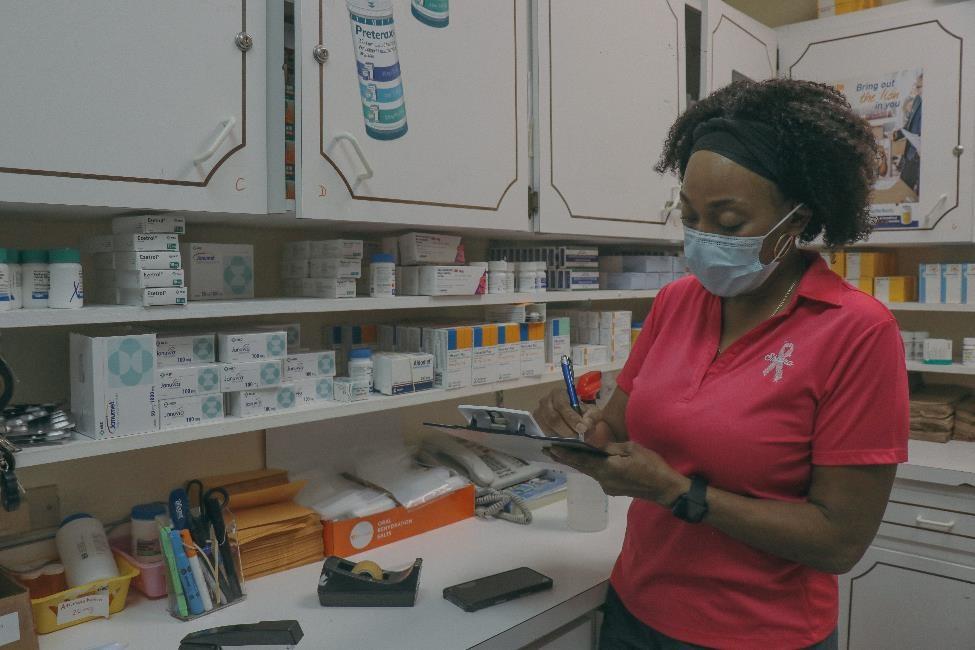The Government of The Bahamas has prioritized the strengthening of regulatory processes for the importation of medicines and other health technologies - an essential part of a well-functioning health system.
Good regulation ensures that the people in the country get safe, effective, quality assured and affordable medicines and other health technologies, such as vaccines. This is especially important during COVID-19 response and the vaccine roll-out.
A stronger regulatory system that can ensure the quality, safety and effectiveness of medicines and other health technologies, including vaccines.
The Ministry of Health and Wellness, with technical guidance from PAHO/WHO and support from the UHC Partnership, developed a policy to register COVID-19 vaccines being imported, based on the recommendations of the Caribbean Regulatory System (CRS). The Government is currently looking to expand this policy, so it applies to all medical products.

“The Ministry of Health and Wellness of The Bahamas has been working with the guidance of PAHO/WHO to expedite a process for assessing products, ensuring quality and access to medicines and health technologies for everybody at prices they can afford.”

"Caribbean countries have struggled to build the necessary regulatory capacity for medicines and health technologies as they are small states with small markets for such products. This means that, on the one hand, there are smaller commercial incentives for manufacturers to operate, so the market is dominated by intermediaries that are not sufficiently experienced to address regulatory demands. On the other hand, small populations also means limited availability of human and financial resources that can be dedicated to the regulatory system.”
"The regulation of medicines and vaccines is important because this is how we ensure that only safe, effective and quality assured drugs and vaccines are imported into the country. The Caribbean Regulatory System has been very important to The Bahamas in terms of identifying which vaccines are safe to import.”
THE LONG READ
During the COVID-19 pandemic, especially with the arrival of the COVID-19 vaccines, the Government of the Commonwealth of The Bahamas placed greater emphasis on regulating the importation of medicines and health technologies. The country has relied increasingly on the Caribbean Regulatory System (CRS), a regional effort that provides recommendations to authorize medical products to Caribbean countries.
“The regulation of medicines and vaccines is important because this is how we ensure that only safe, effective and quality assured drugs and vaccines are imported into the country. The Caribbean Regulatory System has been very important to The Bahamas in terms of identifying which vaccines are safe to import,” said Dr Gina Archer, Assistant Hospital Administrator at the Ministry of Health and Wellness. She works at the office of the Chief Medical Officer and is responsible for the coordination of pharmacy.

Achieving universal health coverage
Access to safe, effective, affordable, and quality medicines and medical technologies is one of the building blocks for strengthening primary health care (PHC)-based health systems to achieve universal health coverage (UHC). Regulatory authorities play a crucial role in protecting the public’s health by ensuring high standards for medical products. They also influence affordability through the assessment of generic medicines and biosimilars for market authorization.
“Caribbean countries have struggled to build the necessary regulatory capacity for medicines and health technologies as they are small states with small markets for such products. This means that, on the one hand, there are smaller commercial incentives for manufacturers to operate, so the market is dominated by intermediaries that are not sufficiently experienced to address regulatory demands. On the other hand, small populations also means limited availability of human and financial resources that can be dedicated to the regulatory system,” said Dean Chambliss, PAHO/WHO Subregional Programme Director for the Caribbean.
PAHO/WHO, through the UHC Partnership, has been working with the Caribbean Public Health Agency and countries in the region to support the development and strengthening of the Caribbean Regulatory System (CRS). The CRS, which provides a single entry into the Caribbean, recommended its first product in April 2017 and has since recommended over 200 products for use in Caribbean countries. The Caribbean Public Health Agency/CRS is a reliance based regulatory system that serves CARICOM Member States and was established in 2015 with continuous support of the Bill and Melinda Gates Foundation and other donors.
PAHO/WHO is providing technical support to the Ministry of Health and Wellness of The Bahamas, in its collaboration with the CRS to establish a fast approval pathway for all recommended products. The Ministry also received assistance in creating a policy document regarding the registration and importation of COVID-19 vaccines into the country.

When COVID-19 vaccines became available, the CRS played a vital role in reviewing and recommending vaccines so countries could approve them quickly.
“The Ministry of Health and Wellness of The Bahamas has been working with the guidance of PAHO/WHO to expedite a process for assessing products, ensuring quality and access to medicines and health technologies for everybody at prices they can afford,” said Eldonna Boisson, PAHO/WHO Representative in The Bahamas.
The Bahamas is among the 115 countries and areas to which the UHC Partnership helps deliver WHO support and technical expertise in advancing UHC through a PHC approach. The Partnership is one of WHO’s largest initiatives on international cooperation for UHC and PHC. It is funded by the European Union, the Grand Duchy of Luxembourg, Irish Aid, the Government of Japan, the French Ministry for Europe and Foreign Affairs, the United Kingdom – Foreign, Commonwealth & Development Office, Belgium, Canada and Germany.
Ensuring access to safe COVID-19 vaccines
The Bahamas had its first reported case of COVID-19 on 15 March 2020 and up until 11 February 2022 has had 33 041 confirmed COVID-19 cases, with 770 deaths. As with all countries across the world, the rollout of the COVID-19 vaccine was going to be crucial to responding to the pandemic.
One of the requirements for COVID-19 vaccine importation in The Bahamas is the recommendation from the CRS. In March 2021, the System issued its first recommendation certificates for emergency use of 3 COVID-19 vaccines. Following WHO’s and PAHO’s guidance, the Government established an expedited approval pathway to ensure timely access to the vaccines. This mechanism was put to the test when WHO’s Prequalification Programme listed the COVID-19 vaccine COVISHIELD™ for emergency use on 15 February 2021.
The CRS signed a confidentiality agreement with WHO to access the vaccine dossier with data on quality, safety, efficacy and a risk management plan. After careful review, a recommendation for emergency use was provided and all the related information was shared with its member countries. The Bahamas accepted and issued a certificate of approval for COVISHIELD™ which allowed it to proceed successfully with importation.
Thanks to the new system, the approval took fewer than the 15 days recommended by WHO. The Bahamas received its first 20 000 doses of the COVID-19 vaccine COVISHIELD™ on 10 March 2021.

A similar process was followed for other COVID-19 vaccines imported into the country. As of 5 February 2022, 150 500 persons received their first dose of COVID-19 vaccine, and 159 839 persons were fully vaccinated.
Expected impact

Timely access to medicines and other health technologies has proven particularly important during the COVID-19 pandemic to maintain delivery of essential health services to the population in need.

Beyond the pandemic, these improvements are also crucial in making the country’s health systems stronger and more resilient so that health for all can be achieved.
Health security and emergency preparedness
The Bahamas has faced many health-related challenges over the past years. In spite of this, the country has shown its commitment to strengthening pandemic preparedness and improving the quality and resilience of its health system, as evidenced in their submissions of the International Health Regulations State Party Self-Assessment Annual Reporting Tool (SPAR). The Government submitted this review in 2018, 2019 and in 2020. The SPAR consists of a range of indicators that are used to monitor country capacity to detect, assess, notify, report and respond to public health risks of domestic and international concern.
To find out more about the implementation of the International Health Regulations (IHR 2005) in The Bahamas and other information related to health security and emergency preparedness, visit the WHO Strategic Partnership for Health Security and Emergency Preparedness Portal.
